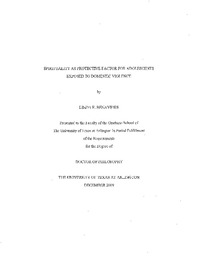| dc.contributor.author | Benavides, Linda E. | en_US |
| dc.date.accessioned | 2010-03-03T23:30:29Z | |
| dc.date.available | 2010-03-03T23:30:29Z | |
| dc.date.issued | 2010-03-03T23:30:29Z | |
| dc.date.submitted | January 2009 | en_US |
| dc.identifier.other | DISS-10420 | en_US |
| dc.identifier.uri | http://hdl.handle.net/10106/2009 | |
| dc.description.abstract | Research has shown that exposure to domestic violence can have adverse developmental outcomes for adolescents. Several protective factors have been identified in the research literature as promoting resilience with at-risk youth. Recently spirituality as a potential protective factor has received attention. The current phenomenological study examined the lived experiences of fourteen adolescents-who had been exposed to domestic violence-to answer the following questions: 1) How do adolescents define spirituality? 2) In what ways does spirituality serve as a protective factor for adolescents exposed to domestic violence? In the current study, both traditional and non-traditional definitions of spirituality emerged. Spirituality appeared to be a source of strength for the participants and manifested itself in numerous ways, including having a sense of purpose and a positive attitude. | en_US |
| dc.description.sponsorship | Rycraft, Joan | en_US |
| dc.language.iso | EN | en_US |
| dc.publisher | Social Work | en_US |
| dc.title | Spirituality As Protective Factor For Adolescents Exposed To Domestic Violence | en_US |
| dc.type | Ph.D. | en_US |
| dc.contributor.committeeChair | Rycraft, Joan | en_US |
| dc.degree.department | Social Work | en_US |
| dc.degree.discipline | Social Work | en_US |
| dc.degree.grantor | University of Texas at Arlington | en_US |
| dc.degree.level | doctoral | en_US |
| dc.degree.name | Ph.D. | en_US |
| dc.identifier.externalLink | https://www.uta.edu/ra/real/editprofile.php?onlyview=1&pid=619 | |
| dc.identifier.externalLinkDescription | Link to Research Profiles | |

